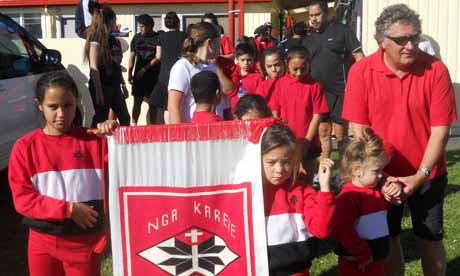Hundreds of people attended the Hui Aranga which took place this year at the Opononi Area School, on Northland’s Hokianga Harbour.
The spiritual director for Te Waiora Catholic group in Palmerston North, Danny Karatia-Goddard, says many of the kapa haka compositions had a Tai Tokerau theme.
He says Northland is well known among Katorika (Catholics) as the cradle of Catholicism with waiata revolving around Bishop Pompallier, the first Bishop to New Zealand, who ministered among many Maori in the nineteenth century including in Tai Tokerau.
About 10 Catholic Māori Cultural Clubs from different parts of the North Island gathered for a combined cultural and faith experience involving kapa haka, sport, prayer, kai and time together in competition and catching up on family.
These Clubs have gathered in this way since 1946. This year the Northern club of Te Ropu o Te Whetu (Whangarei based) were the hosts and about 1500 people (two thirds of whom were youth or children) gathered at the Opononi Area School for the time from Thursday to Monday.
This area of the Hokianga was truly fitting because of the history of the place, which may be described as the cradle of the Catholic Church where Bishop Pompallier and his Marist companions first celebrated Mass and began their mission. Pompallier’s remains are kept in a crypt at Motuti where they are honoured by Pa Henare Tate and the local people. The kaumatua from the Hui made their way across the harbour to visit the place during the Hui. The atmosphere of the Hokianga was very evident, right down to tasting the local mullet fish delicacy.
The weekend consisted in various gatherings under canvas to celebrate the death and resurrection of Christ. At times the Clubs would dress up especially for a religious procession or karakia. Then the many participants put on traditional costume for the waiata, poi, haka and combined action songs, all of which go towards an overall marking for the hui.
The local club from Wellington, called Ngā Karere or The Messengers, won various trophies ranging from Midget Touch, Men’s sacred solo, Midget religious quiz, senior men’s tennis to Junior women’s whaikōrero (oratory). These trophies, which are called taonga (treasures) in fact take on a personal nature and generally are dedicated to ancestors who have died. In a sense they live on in these cups and shields and remind the winners and Clubs of the purpose of the Hui Aranga, namely to live out today the Love and selflessness portrayed for us in Jesus Christ.
In fact this kaupapa (purpose) of the Death and Resurrection of Jesus enters into everything, even the haka which echo strongly in the gathering!
There is a Central Council which co-ordinates the 10 or so clubs which centre mainly down the Whanganui River, (Ohakune or Ruapehu to St Vincents and St Peter Chanel) and then across to Taranaki and back to a strong presence at Tauranga and up to Hawkes Bay.
While Māori Catholic priests and Religious sisters are very thin on the ground, it was lovely to see Pa Tipene Hancy (Whanganui) there. Part of his family tree links with the local Ngā Puhi people, so he was literally ‘at home’. The glow showed in his eyes.
Māori share the shortage of (Catholic) priests and face a tricky future if no vocations to priesthood surface. That may be a more important question for Māori Catholic and the Church to face – not ‘Who will be a Māori Bishop?’, but who will be the Māori priests of the future?
There is a lovely spirit in the place, despite the fierce competition. One of the midgets asked me after they won the Touch rugby final, ‘Did you pray for us, Pa?’
In 2013 the Hui Aranga will be hosted by Te Araukuku, the Taranaki club and will be based at Hawera. In 2014 the Hui Aranga is due to return to Wellington, so already preparation and arrangements and especially fund-raising are under way.
The reggae song of Nepia Takuira-Mita makes a fitting completion to this report. Nepia won the senior men’s sacred solo with a lively number and some of the key words are:
Hui Aranga, Hui Aranga, kia kaha, kia toa
(Easter Gathering, Hui Aranga, be strong, be brave)
Hui Aranga, Hui Aranga, te whānau kotahi mō te katoa.
(Easter Gathering, Hui Aranga, you form one family for us all)
Source
